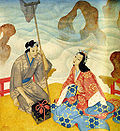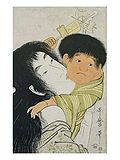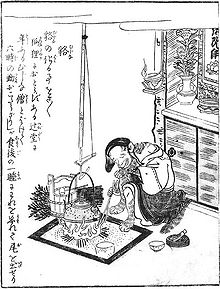- Mujina
-
Mujina (貉) is an old Japanese term primarily referring to the badger. In some regions the term refers instead to the Japanese raccoon dog (also called tanuki) or to introduced civets. Adding to the confusion, in some regions badger-like animals are also known as mami, and in one part of Tochigi Prefecture badgers are referred to as tanuki and raccoon dogs are referred to as mujina.
Like the tanuki and the fox, the mujina of Japanese folklore is an avid shapeshifter and deceiver of humans. One of the forms the mujina is purported to take, as popularized in a story by Lafcadio Hearn,[1] is that of a "faceless ghost". This particular sort of monster is sometimes referred to by English speakers as a mujina, but the Japanese know it as noppera-bō.
Contents
Sightings in Hawaii
On May 19, 1959, Honolulu Advertiser reporter Bob Krauss reported a sighting of a mujina at the Waialae Drive-In Theatre in Kahala. Krauss reported that the witness watched a woman combing her hair in the women's restroom, and when the witness came close enough, the mujina turned, revealing her featureless face. The witness was reported to have been admitted to the hospital for a nervous breakdown. Noted Hawaiian historian, folklorist and author Glen Grant, in a 1981 radio interview dismissed the story as rumor, only to be called by the witness herself, who gave more details on the event, including the previously unreported detail that the mujina in question had red hair.[2] The drive-in no longer exists, having been torn down to make room for Public Storage.
Grant has also reported on a number of other mujina sightings in Hawaii, from ‘Ewa Beach to Hilo.
Other uses
The term can also refer to the following:
- "Mujina", a short story relating to the above legends, found in Lafcadio Hearn's book Kwaidan: Stories and Studies of Strange Things
- Mujina-no-yu is a onsen facility in Nasu, Tochigi, Japan
See also
References
- ^ Monsters You Never Heard Of!: THE MUJINA by Michael D. Winkle. Accessed 3/7/08
- ^ THE FACELESS WOMAN MUJINA. Source: B. Krauss, "Faceless Ghost". Accessed online 03/07/08
- Notes
- de Visser, M. W. (1908). "The Fox and the Badger in Japanese Folklore". Transactions of the Asiatic Society of Japan 36: pp. 1–159. http://books.google.com/?id=zj6GffKNYHkC&pg=RA28-PA155&vq=mujina&dq=mujina. Retrieved 2006-12-14.
- Casal, U. A. (1959). "The Goblin Fox and Badger and Other Witch Animals of Japan". Folklore Studies 18: pp. 1–93. doi:10.2307/1177429. JSTOR 1177429.
- Hearn, Lafcadio; Oliver Wendell Holmes (1904). Kwaidan: Stories and Studies of Strange Things. Houghton, Mifflin and company. pp. 77–80. http://books.google.com/?id=0L4OAAAAIAAJ&pg=RA7-PA78&lpg=RA7-PA78&dq=mujina.
Japanese folklore 
Folktales 
Text collections Legendary creatures Categories:- Legendary mammals
- Japanese legendary creatures
- Shapeshifting
- Ghosts
- Hawaiiana
Wikimedia Foundation. 2010.

